Fifa: the five presidential hopefuls at a glance

Tokyo Sexwale:
* Born in Soweto on March 5, 1953, he grew up amid the turmoil of the township struggle against the Apartheid regime in South Africa.
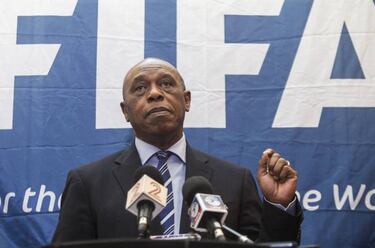
* Has run something of a lackluster campaign and pointedly, has not been backed by his own African confederation, with CAF (Confederation of African Football) making public in January its support of Asian president Sheikh Salman.
* Sexwale was a student leader who fled into exile and joined the armed resistance of the African National Congress, receiving training in Russia.
* He was captured trying to get back into South Africa and sentenced to 18 years on terrorism offences, sent to Robben Island where Nelson Mandela was also incarcerated.
* He spent 13 years in prison and after his release was elected to the ANC’s executive committee and became a regional chairman.
* In 1994, after South Africa’s first democratic elections, he was appointed Premier of Gauteng Province, the industrial heartland of South Africa, incorporating the capital Pretoria and the economic hub of Johannesburg.
* Left his post in 1998 to go into business, quickly making millions in empowerment deals in the mining sector. Sexwale remained a member of the powerful ANC executive committee.
* Appointed to the cabinet of new South African President Jacob Zuma in 2009 as Minister of Human Settlement but removed in a reshuffle after he challenged for the leadership of the party.
* Served as a member of the board of the South Africa 2010 World Cup Organizing Committee after which Sepp Blatter invited him to serve on various FIFA committees, including working as the chief envoy on the Task Force attempting to settle footballing issues between Israel and Palestine.
Gianni Infantino:
* Born in Brig, Switzerland on March 23, 1970.
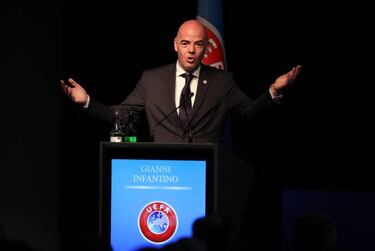
* Studied law at the University of Friburg in Switzerland. Speaks Italian, English, French, German and Spanish.
* Before joining UEFA, he worked as an advisor to football bodies in Spain, Italy and Switzerland, then as Secretary General of the International Center for Sports Studies (CIES) at the University of Neuchatel.
* He joined European soccer's governing body UEFA in 2000. In 2004, he was appointed director of UEFA's Legal Affairs and Club Licensing Division. One of his tasks was to foster close contacts with the European Union, the Council of Europe and governmental authorities.
* Infantino became UEFA's general secretary in October 2009, and right-hand man to president Michel Platini who in December was banned for eight years by FIFA's ethics committee.
* His main task since then has been to implement UEFA's Financial Fair Play policy, a break-even rule aimed at ensuring that clubs do not spend more than their generated revenue. It was initially intended to stop rich owners pumping unlimited amounts of cash into the clubs.
* Infantino has also overseen an increase from 16 to 24 teams in the European championship, starting with Euro 2016 in France. Another innovation has been the League of Nations competition for national teams which critics say is bafflingly complex.
* During Infantino's seven years as general secretary, revenue from Europe's club competitions has grown but so has inequality between elite clubs and the rest.
Sheikh Salman bin Ebrahim Al Khalifa:
* Born in Bahrain on Nov. 2, 1965 and a member of the Bahraini Royal family. According to bookmakers he is the front-runner in the race to become FIFA president.
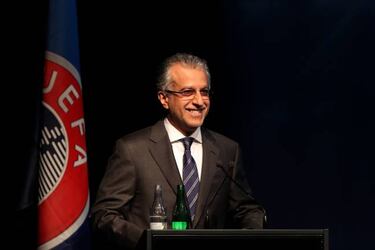
* Graduated from the University of Bahrain in 1992 with a bachelor's degree in English Literature and History.
* Although he never played the game at any elevated level, he rose to prominence as an administrator in Bahraini football and became vice-president of the Bahrain FA in 1998 and president in 2002. He was subsequently elected president of the Asian Football Confederation in 2013 and became a member of the FIFA Executive Committee.
* He immediately made changes to the AFC constitution which in effect meant that Prince Ali Bin Al Hussein of Jordan lost his seat as one of Asia's representatives on the FIFA Executive Committee. The complicated political maneuvering opened a rift with Prince Ali, who is also standing for election.
* Campaign groups including Human Rights Watch, Americans for Democracy and Human Rights in Bahrain and the Bahrain Institute for Rights and Democracy, have all accused him of heading a committee that identified athletes, including international Bahraini footballers, involved in pro-democracy demonstrations during the "Arab Spring" in 2011, many of whom were later imprisoned.
* He has vehemently denied involvement in any wrong-doing, continually denying the allegations throughout his campaign, claiming "these are false, nasty lies, repeated again and again. Do you think that we needed a committee to identify international Bahraini footballers ?"
* In January he signed a Memorandum of Understanding (MoU) with the African confederation which pledged to support his candidature, even though South African candidate Tokyo Sexwale is also running for the office.
Prince Ali Bin Al Hussein:
* Born in Amman on Dec. 23, 1975, he is the third son of the late King Hussein of Jordan. His mother Queen Alia died in a helicopter crash in February 1977 when he was 14 months old.
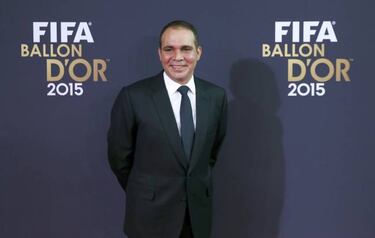
* Stood against Sepp Blatter in the FIFA election in May but, despite backing from Europe and other countries, was beaten by 133-73 votes in the first round. Although that did not give Blatter the winning margin he needed, Ali conceded defeat before a second round was held.
* Also lost his seat on the FIFA executive committee because the vice-presidency seat Ali occupied was re-allocated by the Asian Football Confederation to its own president, Sheikh Salman, who is also now standing in this election.
* Decided to stand again following the crisis that engulfed FIFA last year and has repeatedly said on his worldwide campaign trail that "this is FIFA's last chance to get it right".
* Prince Ali was educated in Jordan, the United States and Britain and holds the rank of Major General in the Jordanian Armed Forces.
* He became president of the Jordan Football Association in 1999 and a year later, he founded the West Asian Football Federation (WAFF).
* He successfully campaigned to lift the ban on female Islamic players wearing headscarves in competitions.
* In 2011, he was elected FIFA vice president for Asia, becoming the youngest member of the executive board at the age of 35. He was also elected vice president of the Asian Football Confederation.
Jérôme Champagne:
* Born in Paris on June 15, 1958
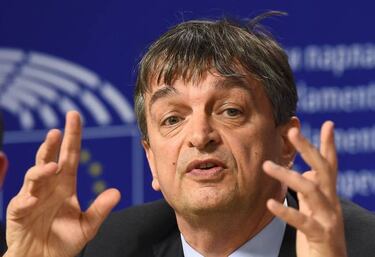
* The 57-year-old Frenchman held senior positions at FIFA before leaving the organization in 2010.
* Was the first to declare he was running in the 2015 presidential election in January 2014, but later pulled out when he could not get the backing of the mandatory five FAs needed to secure a place in the race.
* Completed his education in 1981 after gaining degrees at the Institute of Political Sciences of Paris and the Institute of Oriental Languages.
* Joined France's Ministry of Foreign Affairs in 1983 and during his career as a diplomat served in Muscat in the Sultanate of Oman, Havana, Paris, Los Angeles and Brasilia.
* Became Deputy Consul General in Los Angeles where, during the build-up to the 1994 World Cup in the United States, he met the leaders of the Organising Committee for the 1998 World Cup in France, among them Michel Platini and later Sepp Blatter.
* Left the French diplomatic service in 1997 and began working for the French World Cup Organising Committee as diplomatic adviser and Chief of Protocol under Platini.
* Blatter, then FIFA's secretary general, invited him to join FIFA as his international adviser when he became president in 1998.
* Has always been closely linked with the now-banned Blatter and has never criticized him publicly, despite calling for huge reforms at FIFA.
* Champagne quickly established himself as one of the most influential members of the organization, involved in a host of initiatives including building better relationships with the European Union, the International Olympic Committee, FIFpro - the international players union - and many others.
* Was FIFA's Deputy Secretary General between 2002 and 2005, and was their Director of International Relations from 2007 until he left FIFA in 2010 after political infighting cost him his position.
* Since 2010, Champagne has worked as an independent international football consultant, often in association with FIFA and has helped broker a new initiative in Cyprus involving the Greek and Turkish FAs who signed a declaration last November aiming to unify football on the island for the first time since 1955.
Related stories
* He has also worked on gaining recognition for Kosovo, which means FIFA members can play friendlies against Kosovo, although it is not yet a member of FIFA.